My Trip to Israel: Selecting Next Year's Shinshinim and a View of the Issues in the Northern Region
19/03/2020 09:13:38 AM
Marcy Tepner
| Author | |
| Date Added | |
| Automatically create summary | |
| Summary |
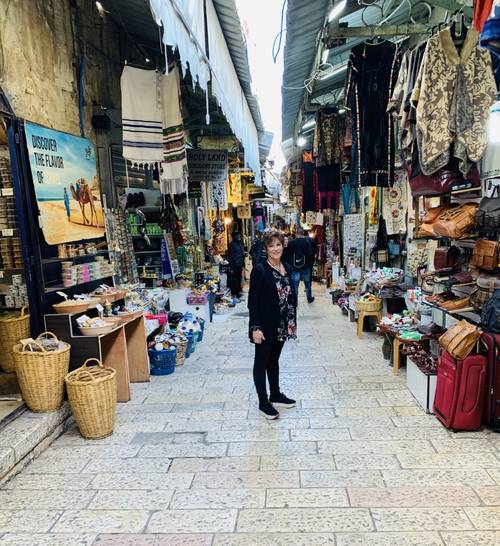
As Darchei Noam’s Lay Leader for the Shinshinim Program, I recently attended a one week, UJA Israel Engagement Mission, along with Ariel Zaltzman, D.N.’s Youth and Education Programming Director. The purpose of the mission was two-fold. Firstly, to participate in the interview/selection process for our 2020/21 Shinshinim, and secondly to learn and experience some of the challenges that Israel faces, particularly in the northern regions. Both components of the mission were thoroughly engaging. The following is an account of the week.
For the first two days, five stellar Shinshinim candidates, that had been pre-screened as a good “fit” for Darchei Noam and our partnership institutions, (Beth David Synagogue, Montessori Jewish Day School, and Canadian Young Judea), were put through a grueling round of interviews, games and programming assignments. We had the opportunity to witness them interact in groups, take on leadership roles, problem solve, and interview each of them individually. After much deliberation, we selected two young Israeli Shinshinim to join our community next year and teach, share and inspire us with “their Israel”. They are, Ofir Yasur and Noa Becker. Ofir comes from an urban kibbutz in Sderot. Ofir is passionate about art, film, youth and rock climbing. Noa hails from Moshav Kerem Maharal, near Haifa. She too is passionate about art, in addition to sciences, maths and all things Israeli. Both Ofir and Noa are creative and have strong leadership skills. Ariel and I are excited to get to know them better and introduce them to the Darchei Noam community.
On the evening of the second day, all mission participants were privileged to hear our key-note speaker, Dr. Ronen Hoffman, introduce the Israel Engagement portion of the trip.
Dr. Hoffman is an expert in crisis management, conflict resolution, and anti-terrorism. He provided an overview of the geo-political situation in Israel, in relation to the surrounding countries in the Middle East. Dr. Hoffman identified which countries, along with Israel, were stabilizing forces and which posed the greatest threats (Shi’ite and Sunni) to peace in the Middle East. As one with admittedly limited knowledge and understanding of the conflict, I found that Dr. Hoffman’s simplified breakdown helped clarify the situation for me. He questioned what Israel’s long term strategy should be diplomatically, security wise and economically for the region. Israel’s role thus far has been primarily reactive, not proactive, and Dr. Hoffman suggested that Israel might need to take a greater initiative in the conflict. Of course action and inaction come with consequences, Dr. Hoffman said, and it is important to weigh the potential risks and benefits in either scenario. According to Dr. Hoffman, the greatest issue feeding the turbulence in the Middle East is the desperation of over 100 million unemployed youth. The picture he painted was grim, but not lost.
On day 3 we boarded a bus and headed north to the Golan Heights and the Hula Valley. Our brilliant and dynamic educator and guide, Michael Bauer, gave us an overview of the challenges and opportunities in the region. We visited the abandoned and bombed out Syrian military headquarters in Kuneitra and enjoyed views of the snow capped Mt. Hermon. ( Both provided great photo opportunities.) We learned about Israel’s struggle to keep the northern region population with Jews, as most Jewish youth tend to migrate south to Tel Aviv after their army service, where there are more opportunities and the vibe is cool. Considering the proximity to both the Syrian and Lebonese borders, and the fact that Jewish Israeli’s are the minority in the region, it is crucial to find ways to encourage young people to resettle and repopulate the area. We then met with a sampling of some of the Jewish residents who have made the north their home. We met a grassroots, hippie couple who live and work on their self-sustaining farm, a director of the Hula Valley initiative aiming to create a tech community in the region and two young women from Kiryat Shemona, working to encourage young Jews to settle in the area.
That evening we were treated to an excellent live theatrical production by actor Robby Greenglass, entitled, “The Gate”. Robby has a number of one-man shows about current Israeli topics that he performs and is planning on coming to Toronto within the next year. I am really hoping that we can get him to perform at Darchei Noam.
On day 4, the focus of our mission was diversity and minorities in the Galilee. We began our day in the ancient city of Tzvat, the hometown of UJA’s director of Israel Engagement, Lior Hameiri. Lior shared a very personal, moving and impactful narrative about Tzvat and its inhabitants in 1948, written by his father. The love that Lior’s father had for Tzvat and its people, both Jewish and Arab, was evident.
The remainder of the day was spent in conversation with Arabs and Jews from the region. We spoke with the Dean of Law, a Muslim Arab Israeli from Tzvat College, the head of the nursing department, an Arab Israeli woman, and the director of a Jewish/Arab Mechina. (For those of you who don’t know, a Mechina is a Kibbutz like, gap year, preparatory program. Participants learn to live independently as a community and do volunteer work, prior to going into the army.) It was so nice to see young Arabs and Israelis working, living together and befriending each other. Lastly, we strolled through the streets of Kfar Salem, an Arab town, at dusk, as its people were called to prayer.
All in all, it was a very eye-opening day. I had the opportunity to witness first-hand the internal strife that Israel as a country faces daily, living a neighbours - Jews, Arabs, Arab Israelis, Palestinians and Druze.
The people we spoke with said they live relatively amicably as neighbours and believe they have the right to live there. Talking people to people, not race to race or religion to religion, made me realize that their individual truths are valid and need to be heard and respected. As Shimon Peres once said, “There are no hopeless situations, only hopeless people.” We must appreciate that Israel is still such a young, developing country, full of complexities, and the process of finding harmony from within will take time, and require much thought, intention, compromise, tolerance and respect. The idealist in me, left that day feeling hopeful that someday all people can co-exist in peace in the region.
The mission culminated by reuniting with our chosen Shinshinim and spending Shabbat with them. We participated in a rousing Kabbalat Shabbat sing-song, an Egalitarian service led by Rabbi Elise Goldstein and programming that questioned and challenged our Jewish values and connection to Israel. I was surprised to discover how deeply connected I felt to all things Israeli (politics aside.) After a meaningful Shabbat, we bid farewell to our incoming Shinshinim, promising to stay connected through Social Media until we can welcome them onto Canadian soil this coming August.
That evening, Toronto’s alumni Shinshinim were invited to join our group. I had a joyful and tearful reunion with last year’s Shinshinit, Noa Dolev, who is now in the army training soldiers on how to use David’s Sling, and my “adopted Ethiopian daughter”, Batel Mamo, who is working on an army medical base. Both girls send their love and regards to our community.
The following week, I traveled around Israel with my husband, Stan, visiting friends, old and new, and appreciating the beauty and diversity of the country. As I processed the previous week’s mission, I felt grateful for playing a small role in helping create ties that bind with Israel through the Shinshinim program. I made many new friends from the Toronto Jewish community and recognized that my love, pride and hope for Israel as a homeland, runs deep within my core. I can’t wait for my next visit! L’Shana Habaah, LIHITRAOT and Shabbat Shalom.
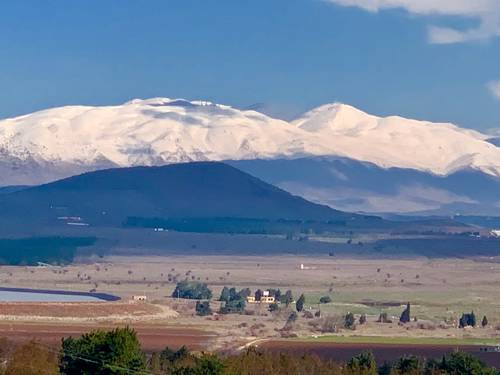 Mount Herman
Mount Herman
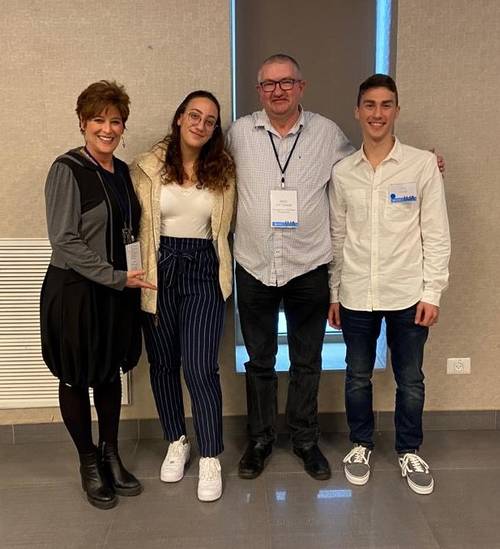
Marcy, Ariel, and next year’s Shinshinim - Noa and Ofir
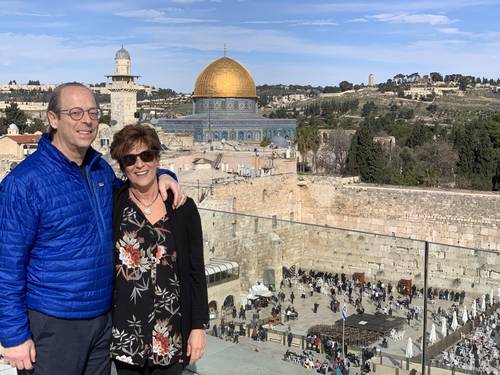 Traveling with Stan
Traveling with Stan
 The Arab Shuk - Jerusalem
The Arab Shuk - Jerusalem
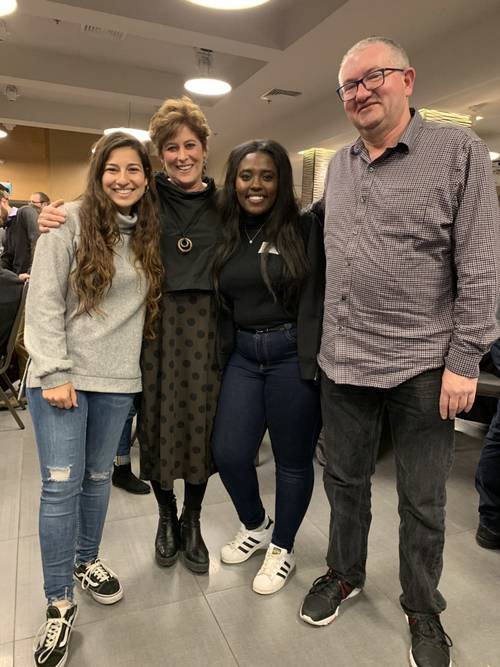 Reuniting with Noa and Batel
Reuniting with Noa and Batel
Fri, 19 April 2024
11 Nisan 5784
Upcoming Programs & Events
Apr 23 Passover Services Tuesday, Apr 23 9:00am |
Apr 23 Second Night Passover Seder Tuesday, Apr 23 6:30pm |
Apr 27 Join us to say Todah Raba and L’Hitraot to Yaron! Shabbat, Apr 27 10:00am |
Apr 29 Passover Services Monday, Apr 29 9:00am |
May 5 Wellness Day Sunday, May 5 9:00am |
This week's Torah portion is Parashat M'tzora
| Shabbat, Apr 20 |
Candle Lighting
| Friday, Apr 19, 7:53pm |
Havdalah
| Motzei Shabbat, Apr 20, 8:58pm |
Erev Passover
| Monday, Apr 22 |
Subscribe to our Friends of Darchei Noam Mailing List


